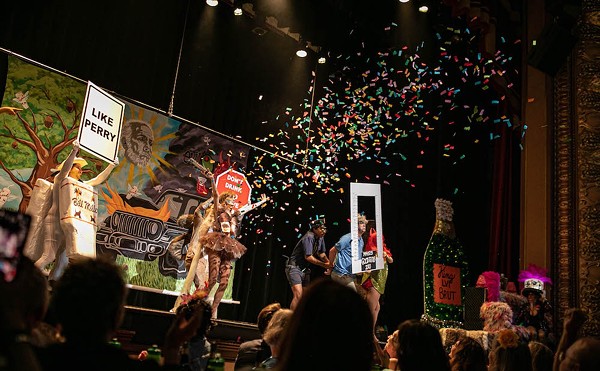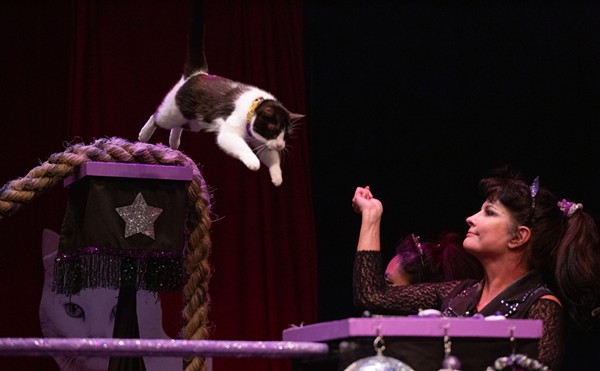David Harrower’s 2007 play Blackbird, currently onstage at AtticRep, hinges on the sexual relationship between a 40-year-old man and a 12-year-old girl. Upon hearing this, I drew a safe map in my mind. Here lies the sunbleached land of advertising imagery, whose lurid billboards of the sexualized adolescent, be she pop idol or supermodel, are at once loudly decried and widely displayed for profit. In the adjoining swamp of news media, legends of child sex abuse serve to admonish, frighten, and unite a ravenous “Us” against an evil, clandestine, yet omnipresent “Them.” (On the TV landscape, nowhere does this dynamic play out more baldly than on Dateline NBC’s To Catch a Predator, wherein the emotional “money shot” comes in the trapped animal shame of the would-be abuser — the audience is invited to indulge in an orgy of unassailable fury at his `and it’s always his` televised monstrousness, and to experience a climax of indignation and schadenfreude wherein his suffering proves not only necessary, but delicious. And why not? Moral indignation is almost as pleasurable as sex, when the right people get hurt.)
Blackbird’s action takes place in one act, between two characters, and in one room, the shabby — no, filthy — break room of a dull and demoralizing workplace where desire goes to die. The AtticRep set is strewn with fast-food garbage and presided over by two monolithic, humming vending machines, the gray industrial carpet and overflowing rubbish cans a (somewhat-overboard) reminder of the contaminating detritus of the past.
Into this mess, a paunchy, middle-aged Peter (David Connelly) — immediately recognizable as every officious, unhappy middle-manager you’ve ever suffered under in his Dockers and belt-holstered cellphone — forcibly drags the now-adult Una (Laura Carter). From the moment we meet them, the duo is locked in battle. We soon understand that Una’s shown up, apparition-like, to confront Peter: It’s been 15 years since Una was 12, and she now wields the potent, damaged power that comes with literally embodying the worst thing Peter’s ever done. As such, Una is understandably hell-bent on lacerating Peter’s life and soul with her outrage. Peter struggles by turns to hide Una, placate her, and disarm her, to manage her as a human consequence both immediate and ongoing.
Their tortured reunion brings to light present and past. Peter’s made desperate attempts to move on, having switched towns and changed his name (to Peter from Ray, which Una persists in calling him). In his self-protecting narrative, which he stutteringly spools out, he works hard not only to earn but, in his own mind, to deserve the job and the relationship he now quakingly maintains. Una, meanwhile, remains unsurprisigly and heartbreakingly calcified at 12, frozen forever at that awful moment of abandon and abandonment. What Una clings to, while barely understanding, is what Ray/Peter hides from, unable to forget: their private, uncharted universe of mutual desire, his desire and hers, however wracked in its circumstances. But Peter holds his behavior as separate from abusers, whose transgressions seem so different, so much more vicious and less (yes) loving than his. Una asserts that Peter, like all pedophiles, lies to himself without knowing it, yet then demands to know, desires to know, despairs to know, where was the essential me in this 12-year-old child’s body you fucked, and fucked over?
David Connelly’s performance gets right under the skin. His stammering, bloviating Peter is at first an irritant, an easy mark for audience disgust. But Connelly gradually, delicately builds uneasy rapport via the acute fear in his raised shoulders, the careworn bafflement of his bearish, dropped head, his halting, exhausted delivery. His “predator” grows from untouchable to viscerally, recognizably human. Connelly’s craft batters down all anticipated and maintained objections we think we’ll have: Ray/Peter may not be living on our comfortable moral high ground, but we can see him from here.
Carter’s work in embodying Una is no less daunting, and the sheer enormity of Blackbird’s terrain may be damn near impossible for any actor younger than 40. Carter’s Una starts with a sneer, and she’s armed with a frequent, high-pitched, reproving laugh that aims at bitterness but stalls out at awkwardness. As the signifying tic of a more lived-in performance, this laugh might pay off as an acting gamble — the outward show of a little girl not quite confident in her role as adult avenger. However, Carter’s occasionally stilted, overly literal delivery of Harrower’s difficult, staccato, stop-and-start dialogue puts her Una at a distance, while Connelly’s now-angry, now-sheepish utterances feel wrested from him in physical pain. Several lines in Una’s longest monologue, where she describes the events of their brief encounter, felt painstakingly delivered and true-to-text rather than discovered and disclosed. I wished director
Stacey Connelly had encouraged Carter to go as deep with her expository lines as she does with Una’s acting-out. During several of Blackbird’s rawest exchanges, Carter abandons actorly vocal gestures and ingenue mannerisms and leaps headlong into a wailing, childlike aria of need — and when Carter lets fly, she devastates.
The real star here, though, is this haunting, unnervingly complex play. Blackbird, as a piece of dramatic literature, assaults the audience, moment by excruciating moment, with shattering revelations: The map not only isn’t the territory, but may be lying; the law, faced with an offense so seemingly straightforward in its call for redress, instead becomes a blunt instrument that smashes all it touches. In lesser hands, Blackbird might have inspired reassuringly distant dismay from the safe narrative harbor of predator and prey (see: Law & Order: SVU). But Blackbird’s voltage is the shock of recognition, not condemnation: For Harrower, for the performers, and, uncomfortably, for us, Peter and Una emerge as an inextricably entwined unit of wounded yearning — now combatants, now confessors, now mourners — for whom the desire and outrage of the past are not only never completely past, but continually radiate new destruction.















